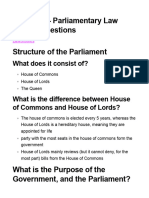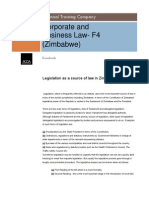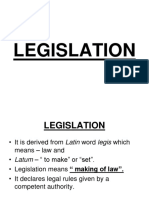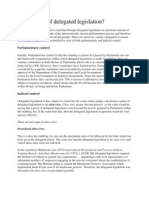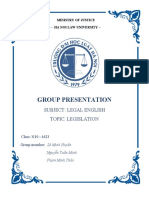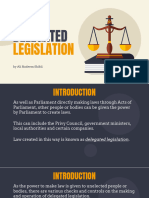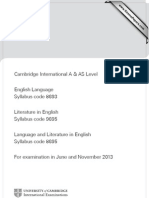Statutory Instruments
Statutory Instruments
Uploaded by
olamideCopyright:
Available Formats
Statutory Instruments
Statutory Instruments
Uploaded by
olamideCopyright
Available Formats
Share this document
Did you find this document useful?
Is this content inappropriate?
Copyright:
Available Formats
Statutory Instruments
Statutory Instruments
Uploaded by
olamideCopyright:
Available Formats
Statutory interpretation concerns the role of judges when trying to apply an Act of Parliament to an actual case.
Golden Rule: Modification of the literal rule, if the literal rule gives an absurd result which isn't what the parliament intended the judges can alter the word to give a just meaning. Common law has to do with customs..also known as unwritten rule Judges have to consider what the common law was before the act was passed in mischief law. Delegated Legislation. The Parliament doesn't have the time or the expertise to pass every law that is required each year. It is therefore necessary for it to give some of its power to other people and organizations to make all the laws. Parliament gives this power in an enabling Act. Types of delegated legislation. There are 3 main types of delegated legislation. a) bylaws. b)statutory instruments. c) orders in Council. Bylaws. By laws are made by local councils and other public bodies; EG: a local council might wish
to ban drinking in its town centre. Another example would be the fines incurred by people who let their dogs foul in public parks. Public corporations,such as the bus and train services,are able to impose fines for non-payment of fares. Statutory instrument. These are regulations made by the government departments to implement the provision made in Acts of Parliament. EG: The department of constitutional Affairs can make changes to the provision of legal aid under the Legal Aid Act 1998. Orders in Council. Orders in Council are laws passed by the Privy Council,which is a group of senior politicians who are allowed to make laws without the need for the whole of parliament to be sitting. The privy council has the power to pass laws in times of emergency with the permission of the queen under the Emergency Power Act 1920. iT MAY DO THIS IN WARTIME. Controls on delegated legislation. General supervision of delegated legislations. Parliamentary supervision of delegated legislation. Court supervision of delegated legislation.
General supervision of delegated legislations. Enabling Act: sets out the powers that Parliament wishes to delegate. Consultation: The enabling act may specify that certain organization or experts must be consulted before delegated legislation is made. Publication: All delegated legislation is published and made available for interested parties to read. Parliamentary Supervision. All bylaws are checked by the relevant Government ministers. All statutory instruments are scrutinized by a group of MPs known as select or (scrutiny) committee. Affirmative resolution procedure requires some statutory instruments to be voted on by parliament . Negative resolution procedure means that most statutory instruments become law unless a debate is requested by a member of Parliament. Question time- Government Ministers are accountable and can be questioned by Parliament . Court Supervision.
Under judicial review, an organization or member of public may challenge a piece of delegated legislation in the High Court. The judge will interpret the wordings of the enabling Act to decide whether the law was made Ultra vires(beyond the power granted by Parliament ) if the legislation is found to be (ultra vires)it would be declared void . Judicial Review (cont). Substantive ultra vires: delegated legislation will be declared void if it allows something that the enabling Act didn't intend. E.G: Commissioners of Customs and Excise V Cure and Deeley 1962, or if the law made under the enabling Act is 'UNREASONABLE' ( Wednesbury unreasonableness) . Procedural ultra vires: the enabling act may set out certain procedures that must be followed before delegated legislation can be passed e.g., agricultural,Horticultural and Forestry Training Board V Aylesbury Mushrooms Ltd 1972 . Homework There is far too much delegated legislation and too little known about it..Evaluate the advantages and disadvantages of delegated legislation and consider to what extent you
would agree with this statement Advantages of Delegated Legislation it saves precious parliamentary time: Parliament is only able to pass about 50 Acts of Parliament per year. Its therefore vital for it to delegate power to make the thousands of other necessary laws. Its flexible: Delegated laws can be passed more quickly if they aren't required to go through the official legislation process. It allows Parliament to concentrate on broad issues of policy rather than masses of details It allows technical matters to be determined by those competent to do so,and can make use of expert knowledge not available within the civil service It also allows local councils to make laws appropriate to their local areas. The enabling Act can impose a requirement of consult ion with those most closely involved before Orders or Regulations are made. It allows rapid action to be taken in times of emergencies . It allows Acts to be implemented piece by piece as circumstances make appropriate . It allows fulfillment of international obligations where amendments is impossible and Parliament can say only yes or no .
Disadvantages. It is undemocratic because it is made by unelected people rather than Parliament . The sheer quantity of delegated laws made each year makes it difficult for the public to be informed of all the changes to the law Although there are controls and checks for delegated legislation,the large quantity makes it difficult for proper scrutiny to occur. The limited scrutiny given to delegated legislation may lead to incomplete or imperfect instrument passing into law . Delegated legislation can be difficult to locate,even for lawyers . An enabling Act may be so brief as to enable a Minister to legislate not just on detail but on policy,which should be the concern of Parliament .
You might also like
- Sources of Law Section 3 Part3-1Document14 pagesSources of Law Section 3 Part3-1Crazy videosNo ratings yet
- Delegated Legislation: Topic 2Document13 pagesDelegated Legislation: Topic 2supervuNo ratings yet
- Chapter 3 - Delegated LegislationDocument8 pagesChapter 3 - Delegated LegislationMiranda RussellNo ratings yet
- Exam Practice Answers - MRN AQA AS Law - Unit 1Document18 pagesExam Practice Answers - MRN AQA AS Law - Unit 1Imama WaqasNo ratings yet
- Knowledge Area 3Document13 pagesKnowledge Area 3HassaniNo ratings yet
- Amending LegislationDocument8 pagesAmending LegislationIkram khanNo ratings yet
- Concept and Constitutionality of Delegated Legislation: Administrative LawDocument10 pagesConcept and Constitutionality of Delegated Legislation: Administrative LawTHE LAW REDEFINED by Shashank singhNo ratings yet
- PA105_Lecture-14_50th-JUPA.pptxDocument12 pagesPA105_Lecture-14_50th-JUPA.pptxmahadikhan029No ratings yet
- Procedure of Law Making in UKDocument5 pagesProcedure of Law Making in UKHafsa SarfrazNo ratings yet
- Delegated LegislationDocument3 pagesDelegated Legislationokello peterNo ratings yet
- LAWDocument6 pagesLAWek4576008No ratings yet
- Delegated Legislation - Administrative Law - Legal Bites - Law and BeyondDocument4 pagesDelegated Legislation - Administrative Law - Legal Bites - Law and BeyondNavin kumarNo ratings yet
- English Law and Other Legal SystemsDocument19 pagesEnglish Law and Other Legal SystemssdfghgfdsaNo ratings yet
- 2-2eng 2003 Jun ADocument19 pages2-2eng 2003 Jun Ablack999100% (2)
- Prakaash MDocument11 pagesPrakaash MFarhin KhanNo ratings yet
- Administrative LawDocument14 pagesAdministrative Lawkuldeep singhNo ratings yet
- Chapter 2 Paliamentary Law MakingDocument8 pagesChapter 2 Paliamentary Law MakingMinahil khurramNo ratings yet
- Delegated LegislationDocument14 pagesDelegated LegislationNandini TarwayNo ratings yet
- Delegated Legislation: Dhaka International UniversityDocument13 pagesDelegated Legislation: Dhaka International UniversityHasanat ParvezNo ratings yet
- IOS DraftDocument13 pagesIOS DraftAyashkant ParidaNo ratings yet
- Administrative Law ControlDocument5 pagesAdministrative Law ControlMercyNo ratings yet
- Admin LawDocument25 pagesAdmin Lawokello peterNo ratings yet
- Unit 5: Legislation: Learning Objectives Defining LegislationDocument7 pagesUnit 5: Legislation: Learning Objectives Defining LegislationRoneil Quban WalkerNo ratings yet
- Notes On Administrative LawDocument27 pagesNotes On Administrative LawOmSilence265188% (16)
- Delegation NotesDocument52 pagesDelegation Notesmartinobwana7No ratings yet
- Chapter 2 - Parliamentary Law Making QuestionsDocument16 pagesChapter 2 - Parliamentary Law Making QuestionsMiranda RussellNo ratings yet
- Delegated LegislationDocument33 pagesDelegated LegislationJr NeyNo ratings yet
- Delegated Legislation Development and Parliamentary ControlDocument18 pagesDelegated Legislation Development and Parliamentary ControlAkshit SinghNo ratings yet
- Delegated LegislationDocument6 pagesDelegated LegislationAkshay BhasinNo ratings yet
- Parliamentary ControlDocument15 pagesParliamentary ControlHeracles PegasusNo ratings yet
- Delegated LegislationDocument18 pagesDelegated Legislationnouf khan100% (1)
- National Law Institute University: A Project OnDocument15 pagesNational Law Institute University: A Project OnDheeresh Kumar DwivediNo ratings yet
- Deligated LegislationDocument4 pagesDeligated LegislationPreeti GuideNo ratings yet
- The Law Making ProcessDocument4 pagesThe Law Making Processotengbenjamin2020No ratings yet
- Delegated Legislation - PaperDocument14 pagesDelegated Legislation - PaperSharmila SaravananNo ratings yet
- BCL 1.4Document8 pagesBCL 1.4UJWALA RANI H RNo ratings yet
- 01 Zimbabwe - S Legal SystemDocument19 pages01 Zimbabwe - S Legal SystemMacjim Frank88% (17)
- LegislationDocument28 pagesLegislationSatyam PathakNo ratings yet
- Delegated Legislation Reasons CriticismsDocument5 pagesDelegated Legislation Reasons Criticismsajakaye ismail opeyemiNo ratings yet
- Law NotesDocument11 pagesLaw Notesmuslimakakar095No ratings yet
- PLAIR Notes - Revision Checklist 7-9Document8 pagesPLAIR Notes - Revision Checklist 7-9Elena100% (1)
- Looking at The Small Print Delegated Legislation: House of LordsDocument6 pagesLooking at The Small Print Delegated Legislation: House of LordssatyajitNo ratings yet
- Delegated Legislation: Unit 3Document23 pagesDelegated Legislation: Unit 3progressNo ratings yet
- Delegated LegislationDocument7 pagesDelegated Legislationmishkatbhai2No ratings yet
- Module - 1 (Iii)Document13 pagesModule - 1 (Iii)Rajat JhirwalNo ratings yet
- The Control On Delegated LegislationDocument2 pagesThe Control On Delegated LegislationRushabh LalanNo ratings yet
- Chapter Legislation Answer OutlineDocument4 pagesChapter Legislation Answer OutlineZainab Mubashar AliNo ratings yet
- Laws Made by Parliament by BookDocument5 pagesLaws Made by Parliament by BookMohsin MuhaarNo ratings yet
- Lecture 8 - Delegated LegislationDocument26 pagesLecture 8 - Delegated LegislationNAS AIDA AFIQAH NASIRNo ratings yet
- Principles of Interpretation of Delegated Legislation - IpleadersDocument9 pagesPrinciples of Interpretation of Delegated Legislation - IpleadersHimanshu BhatiaNo ratings yet
- Group Presentation: Subject: Legal English Topic: LegislationDocument11 pagesGroup Presentation: Subject: Legal English Topic: LegislationHà Anh LêNo ratings yet
- Caf-04 Blaw by Sir Burhan Regards Fahad IrfanDocument123 pagesCaf-04 Blaw by Sir Burhan Regards Fahad Irfanmuzamil azizNo ratings yet
- 3.1 Types of Delegated LegislationDocument11 pages3.1 Types of Delegated LegislationM IdkNo ratings yet
- Sources of LawDocument5 pagesSources of Lawfara.aukNo ratings yet
- Delegated LegislationDocument18 pagesDelegated LegislationDevansh SharmaNo ratings yet
- Delegated Legislation and Its Constitutional ValidityDocument11 pagesDelegated Legislation and Its Constitutional ValidityVardhaman Pandey100% (1)
- Reed's Parliamentary Rules: A Manual of General Parliamentary LawFrom EverandReed's Parliamentary Rules: A Manual of General Parliamentary LawNo ratings yet
- Insiders Talk: Glossary of Legislative Concepts and Representative TermsFrom EverandInsiders Talk: Glossary of Legislative Concepts and Representative TermsNo ratings yet
- University of Cambridge International Examinations International General Certificate of Secondary EducationDocument12 pagesUniversity of Cambridge International Examinations International General Certificate of Secondary EducationolamideNo ratings yet
- 9708 w04 Ms 3Document4 pages9708 w04 Ms 3olamideNo ratings yet
- Cambridge IGCSE Physics Paper 1 Winter 2002Document20 pagesCambridge IGCSE Physics Paper 1 Winter 2002James TongNo ratings yet
- 0620 Sow Unit 2 Particles Atomic Structure Ionic Bonding Perid PDFDocument7 pages0620 Sow Unit 2 Particles Atomic Structure Ionic Bonding Perid PDFolamideNo ratings yet
- 9708 s12 QP 41Document4 pages9708 s12 QP 41olamideNo ratings yet
- Marking Scheme 2005 PaperDocument18 pagesMarking Scheme 2005 PaperPrinceWasilNo ratings yet
- A Church Romance Subject - Matter: Sinking Sad Tower-Window Light"Document14 pagesA Church Romance Subject - Matter: Sinking Sad Tower-Window Light"olamideNo ratings yet
- 0620 s05 Ms 1Document4 pages0620 s05 Ms 1olamideNo ratings yet
- Summer 05Document16 pagesSummer 05Sana DiwanNo ratings yet
- Suzanne Arundhati RoyDocument6 pagesSuzanne Arundhati RoyolamideNo ratings yet
- Analysis of A Horse and Two GoatsDocument2 pagesAnalysis of A Horse and Two Goatsolamide100% (3)
- Statutory InstrumentsDocument6 pagesStatutory InstrumentsolamideNo ratings yet
- Literature SyllabusDocument44 pagesLiterature Syllabusolamide100% (1)
- The People Before EssayDocument10 pagesThe People Before EssayolamideNo ratings yet

























